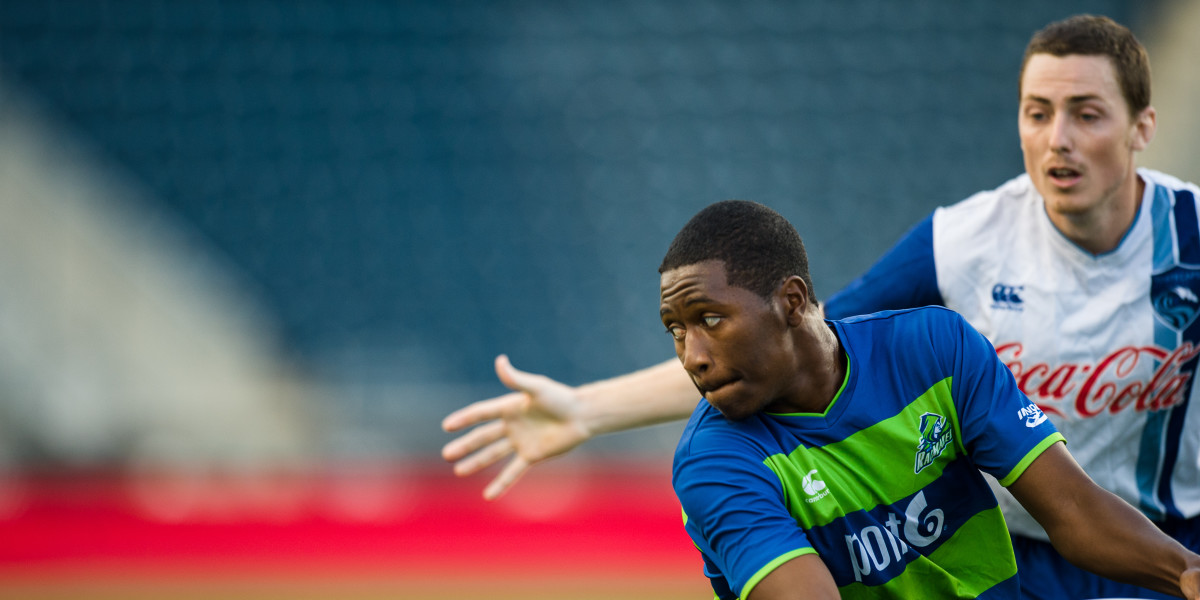 Khalif El-salaam (Seattle Rainmakers #3). 2015 Major League Ultimate Championship Game between the Boston Whitecaps and the Seattle Rainmakers. - Kevin Leclaire (UltiPhotos.com)
Khalif El-salaam (Seattle Rainmakers #3). 2015 Major League Ultimate Championship Game between the Boston Whitecaps and the Seattle Rainmakers. - Kevin Leclaire (UltiPhotos.com)
A version of this article is featured in Skyd Magazine’s Winter 2016 Issue, available now on Amazon.
The Seattle Rainmakers put together a thrilling MLU season last year. While early season matches were up-and down, with downs primarily coming against the rival Portland Stags, the Rainmakers never let themselves fall too far out of the playoff picture. And as the season went on, and the team was able to gel defensively, results started coming. They played the Stags tougher and tougher, and started consistently beating the rest of their opponents. The team started following a Pete Carroll-esque blueprint for success: blow out bad teams, and play the good ones close while trying to win the turnover battle. Results followed, and even with a narrow final day loss to the Vancouver Nighthawks, a wild card berth was in the cards for the Rainmakers.
I spent the past MLU and AUDL season learning ultimate by watching the game played professionally. I came to the sport having thrown a disc around a bit in college but never having played an organized game, and having seen some YouTube clips, but never having seen a full match played at the highest level. My way into the game was as a spectator, a traditional path to fandom in many sports, but unusual in ultimate. I’m not sure if traditional sports fandom, watching rather than getting my hands dirty and picking up a disc, is the purest manifestation of “the spirit of the game,” but here we are.
Last season afforded me the opportunity to talk to people who play and coach the sport at a high level, and in whole I think the future of the game is bright. More broadly, I also, like pretty much everyone I met who is engaged with the potential professionalization of the game, have a lot of thoughts now about the future of ultimate as a potential professional sport. As I dive in to breakdown my experience of a season learning ultimate, I’ll try to separate my business thoughts and my thoughts on gameplay.
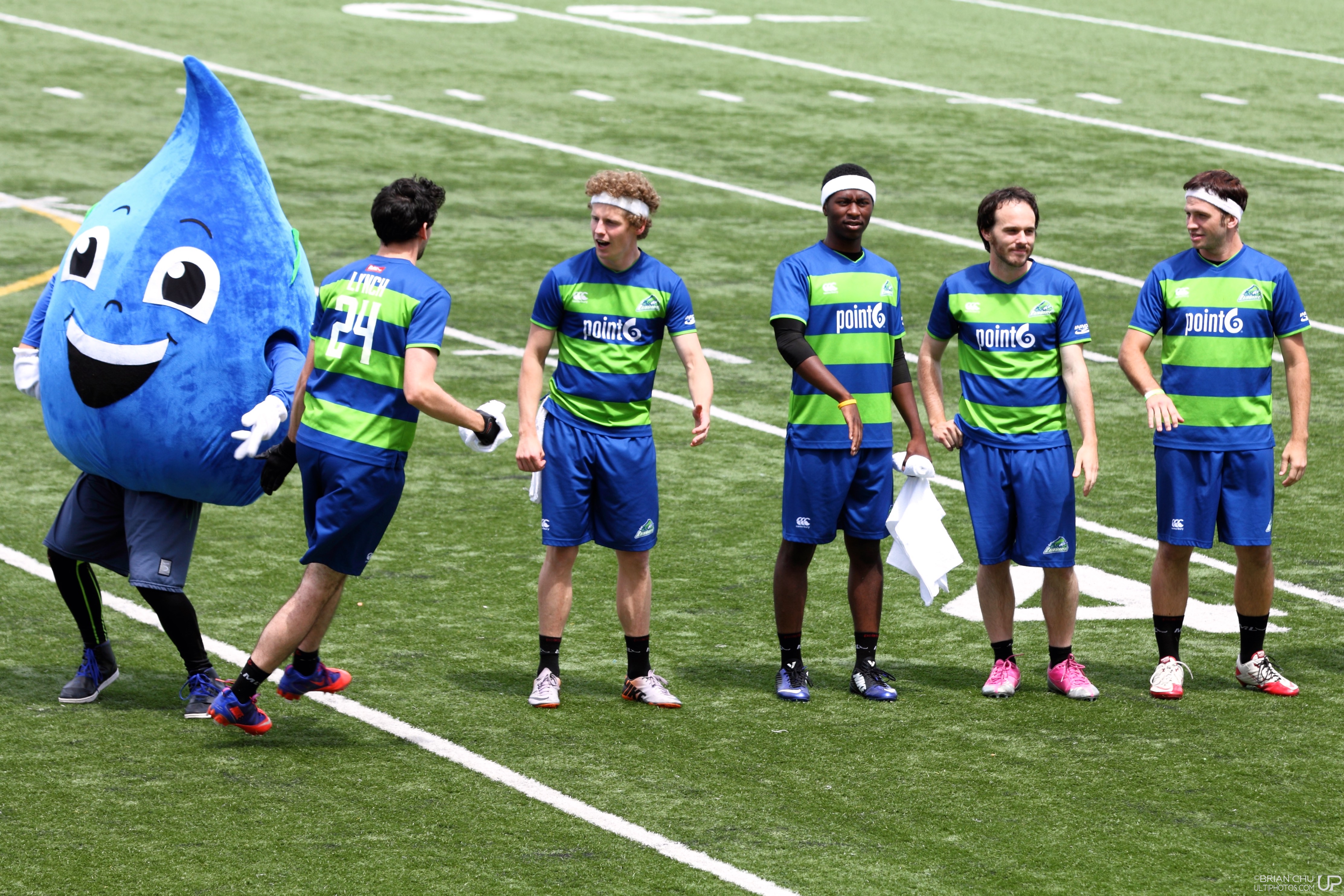
Seattle, WA: Seattle Rainmakers and San Francisco Dogfish in a regular season game for Major League Ultimate (MLU) at Renton Memorial Stadium. – Brian Chu (UltiPhotos.com)
There’s a dumb expression you’ll hear in the NFL playoffs: it’s hard to beat another team three times. Dumb because it’s obvious, and also because it suggests that previous results should lead you to anticipate a different future result. If a team is beating you consistently, there’s probably a reason why.
With the Portland Stags and Seattle Rainmakers during this past regular season, the Stags owned the Rainmakers because they were bigger and stronger and also better organized. That’s a pretty dominant combination, manifested in Stags cutter Cody Bjorklund. He’s big, fast, dominant in the air, and able to punish defensive errors. As the Rainmakers got better defensively over the course of the season their losses to Portland were increasingly narrow, but when you head into a playoff match against a team who has gone 3-0 against you already, it’s tough to be optimistic.
Did that stop the Seattle Rainmakers from securing the upset of the season in the Western Conference Finals? Of course not. The final score, 17-16, only tells part of the story. It was a defensive battle. But Seattle really did grab the match by the throat late, they managed to shut down an attack that had opened them up time and time again in previous showdowns, and earned themselves an MLU final berth.
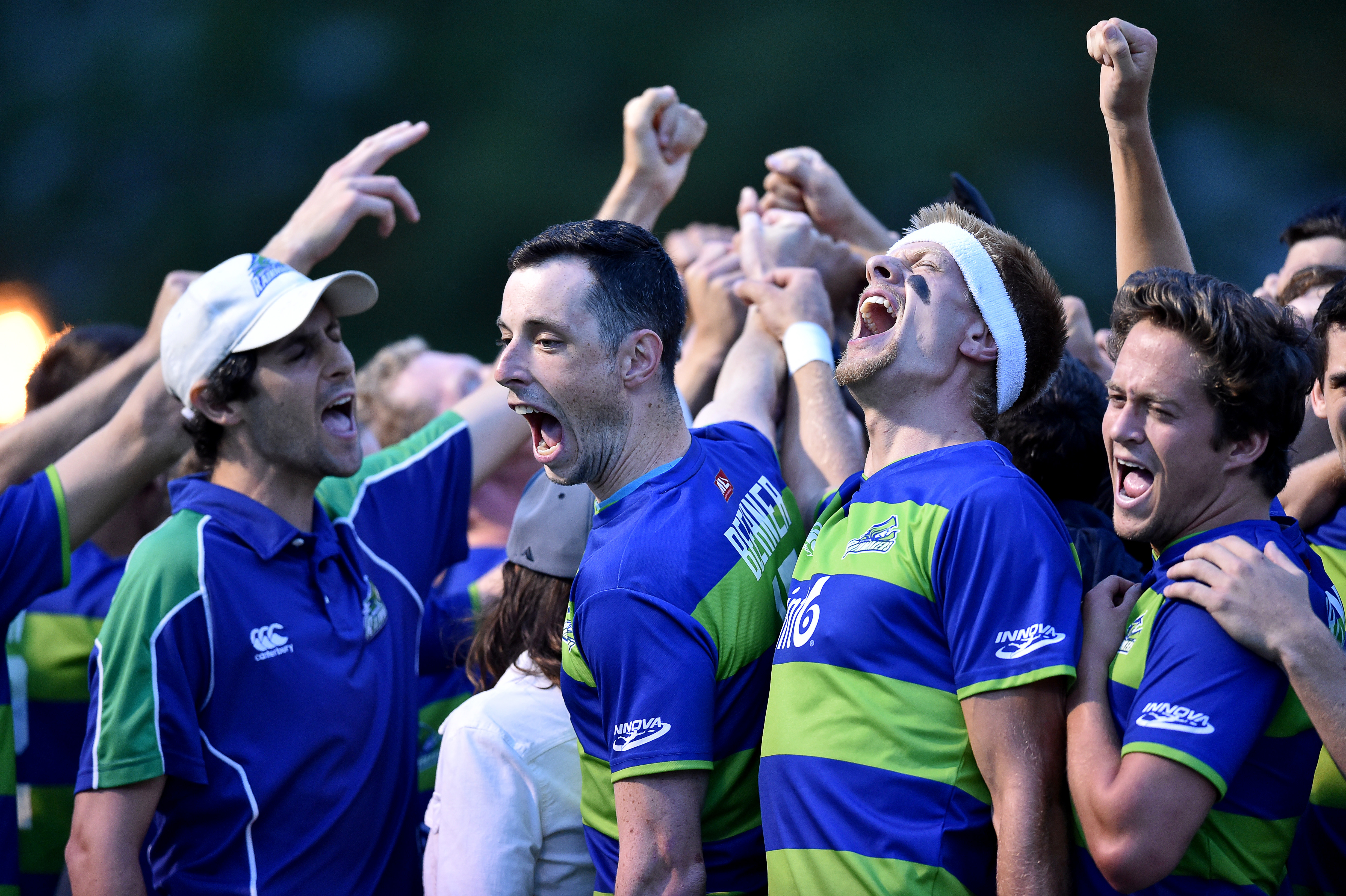
The Portland Stags lost to the Seattle Rainmakers in the Western Conference Finals held at Lincoln High School with a score of 17-16. – Scobel Wiggins (UltiPhotos.com)
Professional sports are a business, and professionalizing ultimate is an inherently risky endeavor. Every model used thus far has problems, and essentially relies on either players or owners to foot a large portion of the bill just for the league to exist.
This is okay. This is a necessary step for the growth of any professional sport.
Were ultimate to have followed the player centric model it would likely have yielded a player-friendly ownership structure like the one in European Football that emerged from football clubs conglomerating into paying leagues. This is the model that would have seen club ultimate turning pro. This isn’t exactly what happened with ultimate, but it’s also is not the model that has proven to work in America. Our sports have always professionalized with an owner driven model.
In order for ultimate to succeed as a professional sport, it has to be willing to lose money up front. The payoff is potentially extraordinary. Looking at the NFL, many of the league’s great fortunes are great fortunes because of the success of football. And there were moments where all was almost lost. At one point the Steelers and Eagles had to play as one unified team called the Steagles just to survive. Without the proliferation of television, which was unforeseeable when the first teams were founded, most NFL owners would have lost everything. Now, having risked everything, these owners are ludicrously wealthy.
But a new sport isn’t guaranteed to succeed just because football did. The question is whether the game of ultimate can capture the imagination of the public in a way that will lead to at least hundreds of thousands of people caring about the matches, and wanting to watch them live.
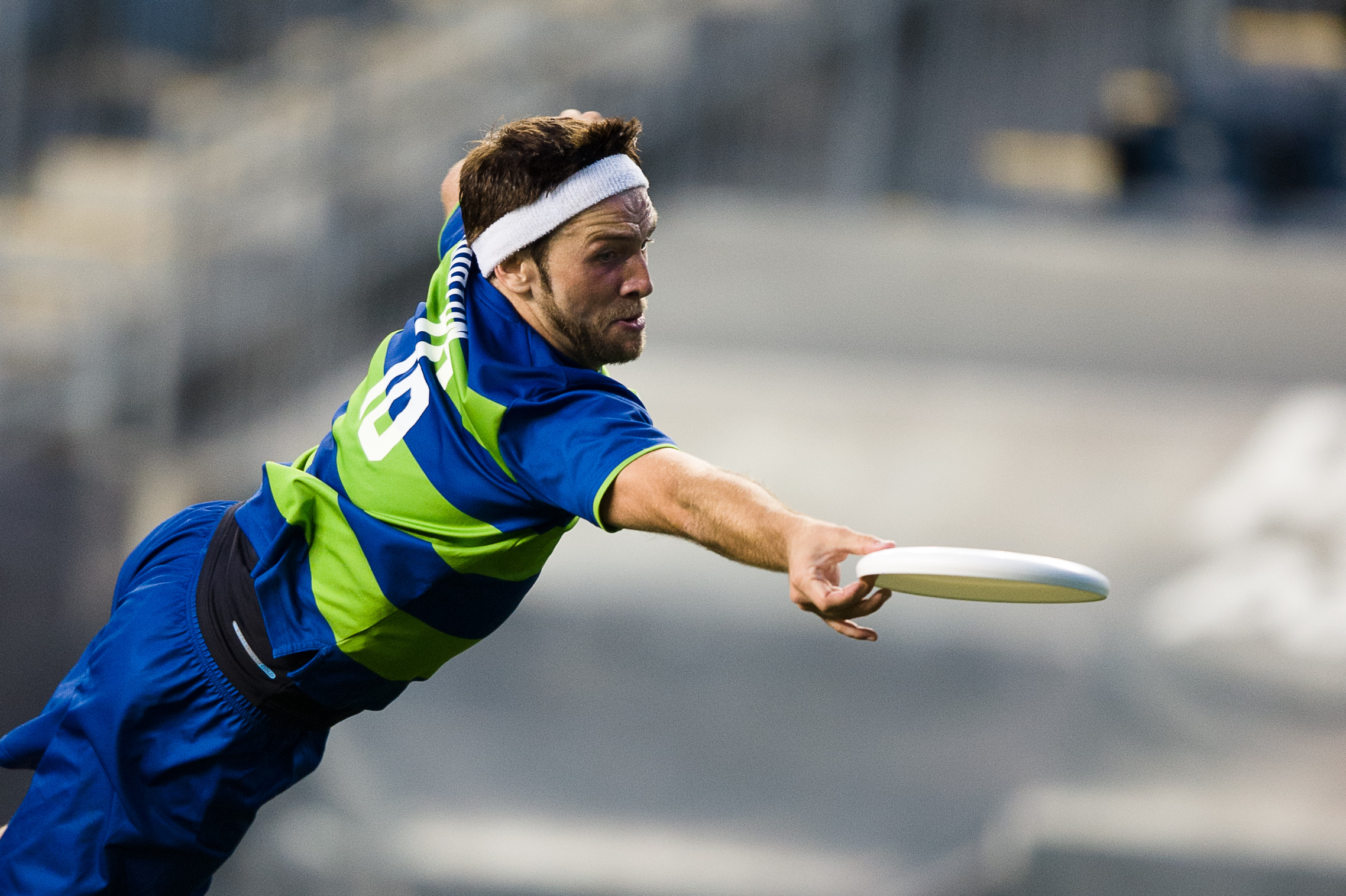
Mark Burton (Seattle Rainmakers #16) layout catch. 2015 Major League Ultimate Championship Game between the Boston Whitecaps and the Seattle Rainmakers. – Kevin Leclaire (UltiPhotos.com)
Seattle doesn’t win professional sports titles. If you want to talk about the 2014 Seahawks, fine, but it took a Malcolm Smith interception on a Richard Sherman deflection that was as much a glitch in the Matrix as an actual football play to get them to the Super Bowl. Seattle isn’t a city of champions.
And the Rainmakers were no different. The trouble with staging the upset of the year in the conference finals in a rivalry game against an opponent you’ve faced multiple times previous is that you can run into a finals opponent that’s both superior and unknown, leaving you without a foothold for a psychological edge.
The Boston Whitecaps throttled the Rainmakers 31-17 in Philadelphia. For Boston it was the culmination of a dominant year in which they went 9-3 with a league leading 44 goal differential in the regular season. For Seattle it was a reversion to early season defensive issues. Making the finals still qualifies as a dream season for the Rainmakers, but it was just a regular good dream. I think that’s okay.
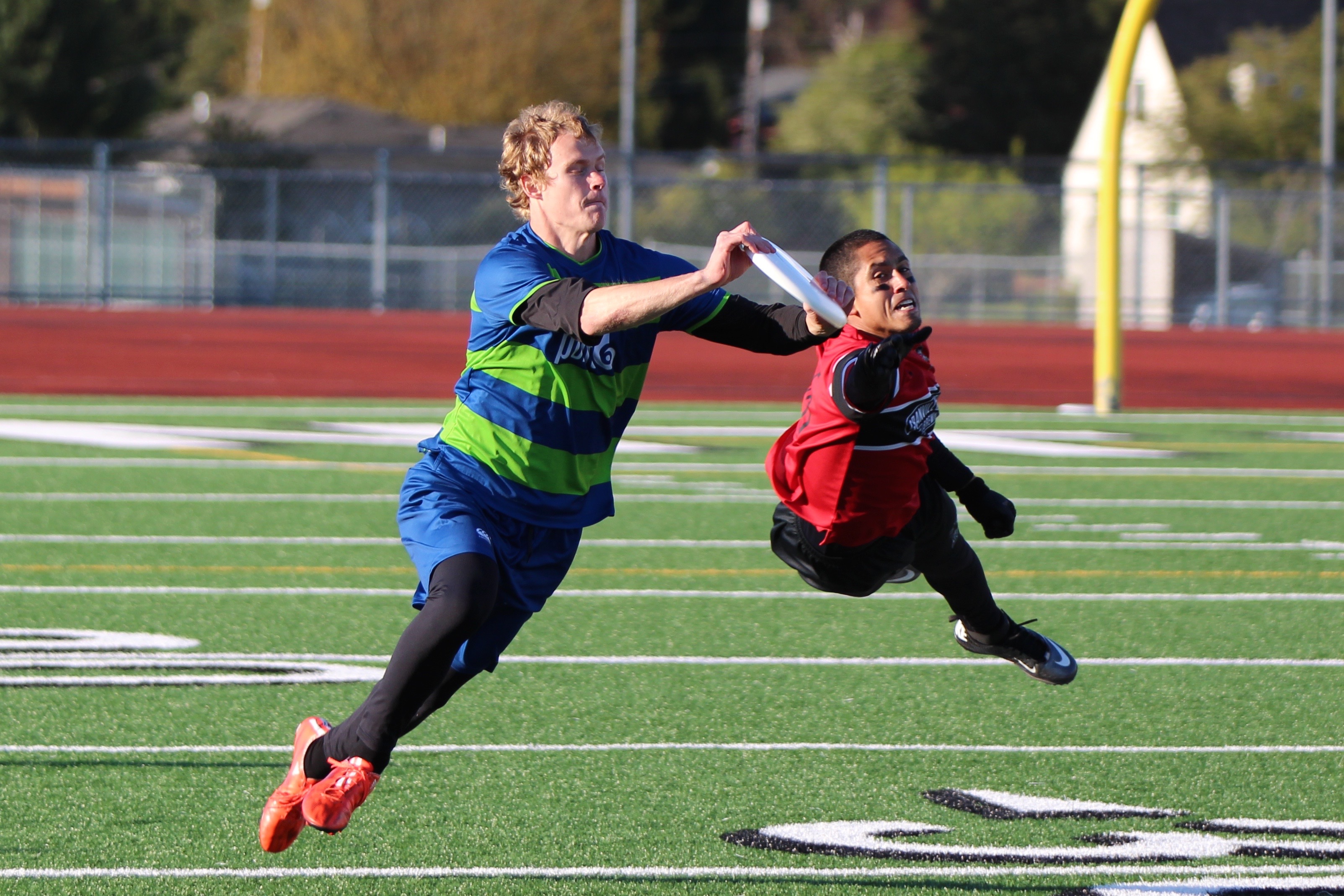
Mount Vernon, WA: Major League Ultimate’s Seattle Rainmakers hosted their rivals from the North, the Vancouver Nighthawks, at the annual “Border Bid” match. – John King (UltiPhotos.com)
Based on what I saw last year, beyond the game itself, the two aspects of the sport that run in professional ultimate’s favor are the athletes who best succeed at it, and the horror show that is the NFL.
It’s a dusty old saw that if America’s best athletes played soccer we’d win the World Cup. It’s also brutally inaccurate. The way in which America defines its best athletes means our best athletes are better suited for games where height and strength mean more than they do in soccer. Coordination matters, but less than speed and decision making. Which is to say the sport in which the quintessential American athlete has the biggest edge is ultimate. Picture that kid who dominated every game without trying in your high school. The kid who could pick up a playbook and dive in at quarterback or wide receiver, then switch to basketball and succeed as a two-way player on the wing. You just pictured a potential ultimate superstar.
In a world where baseball is a glorified individual sport, professional basketball still requires freakish innate features (namely being very tall), European soccer training still vastly outpaces its American counterparts, and football is destroying its players, there’s potential for great young American athletes who want to play a team sport to gravitate towards ultimate. This is huge. If the best athletes play ultimate the sport will be more exciting and draw more eyeballs.
The other factor is football. I love football, but the game is not tenable going forward. With over 90% of professional football players testing positive for serious brain damage in a recent Frontline study, and staggering numbers of amateur players also showing serious brain injuries related to playing football, I can’t imagine a world where America keeps injuring its best and brightest in pursuit of regional athletic glory. Something will change. And even a fractional change in the talent pool and popularity of football will open up room for alternative sports. Ultimate looks like football without the collisions, which will alienate some fans, but did not in anyway alienate me. In fact, a more rigorously coached professional ultimate league is arguably the perfect methadone for a nation of football junkies.
But this is all pragmatism and reductive business talk, which is not in tune with the spirit of the game. I guess the question is, do I like it? Did I break past the lingering stereotypes around ultimate to engage with the sport as a sport on its own merits?
And the answer is yes.
I like the personality of ultimate as an event. Not to sound like some sepia-toned baseball film reel, but I like the kids playing the game, and the mascots and food trucks. I like the environment, and the passion.
But more than that, I like that when played at the highest level ultimate is a forum for players to creatively display their athleticism. The moments I remember were tricky throws, where players worked in sync to create ludicrous angles that would be impossible to cover with a ball. I love diving catches, and seeing players on both sides of the disc laying out for gamechanging grabs was thrilling. It’s awesome seeing the ridiculous skills guys have, watching someone bring in a disc a quarter-inch off the ground, and making it look routine.
Where the game was lacking, and where I know the game is going, is innovative team wide strategy. There were too many moments where plays felt a bit rote, where defenses were too lax, or alternatively where pressing was too effective. A few of the rules still didn’t quite make sense to me; I think a rule tweak could make pulls more interesting, and I still have questions about the role of the clock in the game.
But on the whole, I’m genuinely grateful for the opportunity to care about a new sport. To learn a game, to get that chance to engage with something fresh. And I’m grateful to how open everyone has been as I’ve learned about the game. The enthusiasm around the sport is infectious, and as the game grows, I’ll be watching.











Comments Policy: At Skyd, we value all legitimate contributions to the discussion of ultimate. However, please ensure your input is respectful. Hateful, slanderous, or disrespectful comments will be deleted. For grammatical, factual, and typographic errors, instead of leaving a comment, please e-mail our editors directly at editors [at] skydmagazine.com.